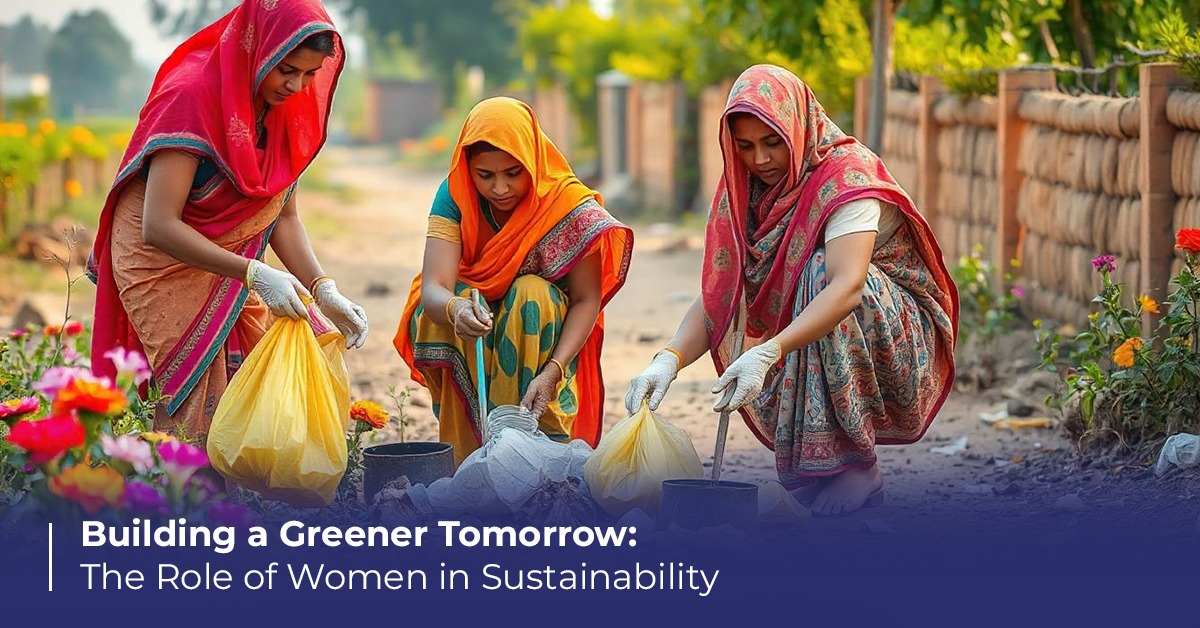As the world grapples with climate change and environmental degradation, sustainability has become an urgent priority. The need to preserve natural resources, reduce waste, and promote cleaner energy sources has never been greater. While many factors contribute to sustainability, one of the most crucial yet often overlooked drivers is the involvement of women. Across the globe, women are leading efforts to protect the environment, reduce poverty, and build more sustainable communities.
This blog post delves into the key role women play in sustainability, their impact on driving change, and how supporting them can help build a greener tomorrow.
What is Sustainability and Its Importance?
Sustainability is about meeting our present needs without compromising the ability of future generations to meet theirs. It focuses on maintaining a balance between economic growth, environmental protection, and social well-being. In simpler terms, sustainability means living in harmony with the planet, ensuring that we don’t deplete natural resources or harm ecosystems while still meeting the needs of human societies.
The importance of sustainability or sustainable development is clear. Climate change, resource depletion, and biodiversity loss are significant challenges that threaten the future of our planet. Adopting sustainable practices can help mitigate these problems, preserve the earth’s resources, and protect the environment for future generations.
Related Blog: The Future of Sustainability: Top Trends to Watch in 2025
Role of Women in Sustainability
Women play an essential role in sustainability in many ways. Their involvement is not only critical for achieving environmental goals but also for promoting social and economic equity.
1. Guardians of Natural Resources:
In many indigenous and rural communities, women are the primary custodians of natural resources. They manage water, land, and food production, ensuring that these resources are used sustainably.
Women’s knowledge of traditional agricultural practices, like crop rotation and organic farming, helps maintain soil health and reduce the need for harmful pesticides.
2. Entrepreneurs and Innovators:
Women entrepreneurs are at the forefront of sustainable business practices. They create eco-friendly products, from sustainable fashion lines to renewable energy solutions. By integrating sustainability into business models, they are creating positive environmental and social impacts.
3. Leaders in Environmental Activism:
Many women have become global leaders in environmental activism. Figures like Greta Thunberg, Vandana Shiva, and Wangari Maathai have raised awareness about climate change, deforestation, and the rights of marginalized communities, showing the power of women in driving large-scale change.
4. Advocates for Policy Change:
Women are also playing a significant role in advocating for policies that address climate change. From grassroots movements to policy-level debates, women are demanding stronger climate action and more inclusive environmental policies. Their voices in political spaces are leading to more comprehensive and gender-sensitive environmental policies.
How Women Are Leading the Way in Sustainability?
Women around the world are leading sustainability efforts in a variety of ways. Their contributions span across sectors and communities, from grassroots movements to multinational corporations. Here are some of the ways women are driving sustainability:
- Community Leadership in Renewable Energy Projects: Many women in rural areas have pioneered solar energy initiatives, particularly in regions without reliable access to electricity. These projects reduce reliance on fossil fuels and provide clean energy to underserved populations.
- Women-Led Environmental NGOs: Numerous NGOs led by women focus on environmental conservation, promoting sustainable agriculture, and protecting biodiversity. These organizations are central to advocating for climate action and creating tangible solutions to environmental challenges.
- Eco-friendly Entrepreneurship: Women entrepreneurs are creating innovative, sustainable businesses that reduce waste, promote recycling, and offer environmentally friendly products. Examples include sustainable fashion brands, eco-tourism ventures, and zero-waste stores.
- Promoting Circular Economy: Women are advocating for circular economy practices, where products are designed to be reused, repaired, and recycled, reducing waste and resource consumption.
- Public Awareness Campaigns: Women have taken the lead in raising awareness about environmental issues through social media, public speaking, and community engagement. These campaigns highlight the urgency of climate action and mobilize people to act.
Key Areas Where Women Are Driving Sustainability
Women’s contributions to sustainability are not just limited to one sector but extend across multiple key areas. Below are the areas where women are making the most significant impact:
- Sustainable Agriculture: Women in agriculture are promoting organic farming and sustainable crop management practices, which reduce the need for chemical fertilizers and pesticides. They focus on biodiversity, soil health, and water conservation.
- Water Management: In many communities, women are the primary managers of water resources. They play a crucial role in ensuring water is used sustainably for both agricultural and domestic purposes.
- Waste Management: Women are leading efforts in waste segregation, recycling, and composting, helping reduce landfill waste and promoting the reuse of materials. They also lead community clean-up drives and advocate for waste reduction policies.
- Conservation and Biodiversity Protection: Women are involved in preserving natural habitats and protecting wildlife. From grassroots conservation groups to international environmental NGOs, women are actively working to safeguard biodiversity.
- Green Energy Solutions: Women are leading the way in clean energy initiatives, from solar power in rural communities to advocating for renewable energy policies in urban areas. Their efforts contribute to reducing reliance on fossil fuels and combating climate change.
Future of Women in Sustainability
The future of women in sustainable development looks promising. As sustainability becomes a priority on the global agenda, the role of women will continue to grow. Here are some trends and opportunities that could shape the future:
- Increased Access to Education and Training: As more women gain access to education and training in environmental sciences, engineering, and business, they will be better equipped to lead sustainability efforts in various sectors.
- Expansion of Women-Led Green Startups: The rise of green businesses, particularly those led by women, will continue. These businesses are offering innovative solutions to environmental challenges while creating job opportunities for other women.
- Greater Representation in Decision-Making: Women’s involvement in policymaking and leadership roles in environmental organizations will increase. Their perspectives will be essential in shaping sustainable and gender-sensitive policies.
- Stronger Global Networks for Women in Sustainability: As global environmental challenges become more pressing, networks of women working in sustainability will continue to expand, creating opportunities for collaboration, knowledge-sharing, and collective action.
- Focus on Intersectionality in Sustainability: Future sustainability efforts will be more inclusive, recognizing the intersection of gender, race, and class. Women from diverse backgrounds will have an important role in creating solutions that address environmental and social issues simultaneously.
- Women in Climate Finance: With increasing investments in sustainability projects, women are expected to play a greater role in climate finance, from green bonds to impact investing, ensuring that environmental initiatives are financially sustainable.
FAQs About the Role of Women in Sustainability
Q1. How are women’s leadership roles helping the fight against climate change?
Women are driving climate action by advocating for policies, leading environmental organizations, and implementing sustainable practices in their communities. Their leadership ensures that climate change solutions are gender-sensitive and inclusive.
Q2. What are some examples of women-led environmental organizations?
Organizations like the Women’s Earth Alliance, Green Belt Movement (founded by Wangari Maathai), and Global Greengrants Fund are examples of women-led NGOs making a significant impact in the fight against climate change and environmental degradation.
Q3. How does gender equality contribute to more effective sustainability practices?
Gender equality ensures diverse perspectives in sustainability efforts. When women are included in decision-making, it leads to more inclusive policies that address the needs of all communities, making sustainability practices more effective.
Q4. How can women’s participation in sustainability be increased?
Women’s participation can be increased by providing access to education and training in sustainability fields, supporting women-led businesses, and promoting gender equality in environmental leadership roles.
Q5. What role do women play in the green economy?
Women play a crucial role in the green economy by leading businesses that provide sustainable products and services, advocating for policies that protect the environment, and managing natural resources in a way that supports both the economy and the environment.
Conclusion
Women’s involvement in sustainability is not just beneficial; it is essential. From grassroots initiatives to high-level leadership, women are contributing significantly to building a greener, more sustainable future. Their role in advocating for environmental policies, creating sustainable businesses, and implementing eco-friendly practices is driving positive change. To build a greener tomorrow, it is crucial to empower and support women in their efforts to protect the planet.
Support Women in Sustainability: Together, We Build a Greener Tomorrow
At Prabhu Naidu Ltd, we are dedicated to empowering women by offering specialized programs aimed at enhancing skills and fostering economic independence. Through initiatives like training over 200 women in export-type stitching and developing garment production specifically for export orders, we’ve opened doors to global markets and new opportunities.
Today, we work with over 5,200 women in Kolhapur and relate to more than 25,000 women across the country, supporting them in achieving financial independence and personal growth. Visit Prabhu Naidu Ltd to discover how we are driving women’s empowerment through sustainable practices.


